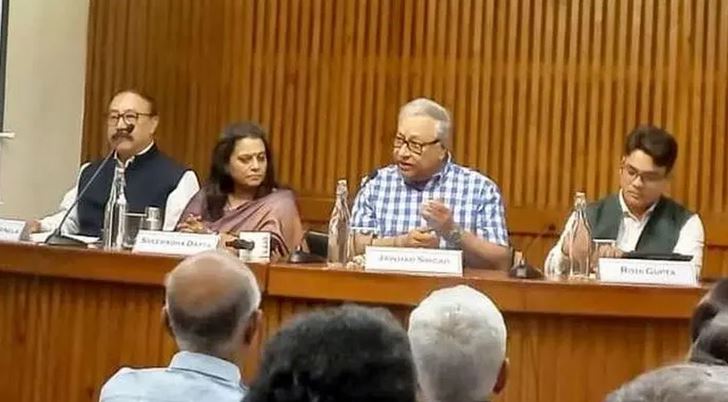The sudden (change) came as a shock (to Delhi)… Now we have to accept that whoever the voters of Bangladesh identify as their ruler, we have to accept.
Former Indian top bureaucrat and former CEO of Prasar Bharati Board, Jahar Sarkar Biswas, told the BBC about the next parliamentary elections in Bangladesh. He also said, we have to accept, understand the current situation in Bangladesh. More than understanding, we have to accept. At this moment, India should wait to see what the results of the elections in Bangladesh are without giving in to any provocation.
A discussion meeting was recently organized by the India International Centre (IIC) in Delhi, a major center for studying various foreign issues in India, on the next elections in Bangladesh. Analysts discussed various possibilities there, focusing on the question of what kind of preparations are desired from India in view of those elections.
In response to the question of whether the new government of Bangladesh is not friendly towards India, Zahar Sarkar said, “That is right, what will happen if a point of view comes up, if that government is against us? Hey, these things are the next thing… these are the next thing… no one knows who will come and who will go. What is actually happening, (in Bangladesh) some angry people are saying something in pieces, on the basis of which there is an immediate reaction, people are getting angry.
“Actually, we have to remember that the current government (in Bangladesh) is a caretaker government, there is no need to say or poke them so much, they can just hold the election.”
Former Indian High Commissioner in Dhaka Harsh Vardhan Shringla was also present at the discussion. There, he said, “If a wrong government really comes to power in Bangladesh, then I am really hesitant to think about what the consequences could be for our security and long-term interests.” In fact, there is a practical aspect to it, a security aspect, which is a matter of concern for all citizens of India.
‘It is very easy to say, whoever wins and comes to power, we will work with them; but if that person works against your interests, then you have to be aware of that. Then you cannot say, oh, you are in power there, that is fine.’
Harshvardhan Shringla also believes that India can never ignore the situation in the countries of India’s neighbours in South Asia, calling it their ‘internal matter’. That is, where India’s interests are involved, it is certainly India’s matter.
He said, although I have already said that we want to work with all our neighbours in the spirit of cooperation, and that is the essence of our ‘Neighbourhood First’ policy, but here it seems that we are facing a difficult situation. We have to see to it that our security interests are protected. And if we talk about our immediate neighborhood, there can be no such thing as internal affairs in countries with which we share a common border!
Another participant in the discussion was Sriradha Dutta, a professor of international relations at OP Jindal University and a long-time Bangladesh researcher. The BBC report says that she recently visited Dhaka and met with top leaders of various parties including Jamaat, BNP, NCP.
In the context of those discussions, she feels that at least the Awami League is not able to participate in the next elections. And India should also accept that reality.
Why didn’t we talk about inclusive elections in 2014, 2018 or 2024? Why are we talking about it now? She also asks such questions.
In fact, the way India blindly ‘approved’ vote rigging or being outside the BNP in the last three elections, she believes, is weakening their moral position now.
‘So I think we should tell Bangladesh now that they will decide for themselves, we will accept that. It may not be our choice, it may not be. But their point of view, meaning what they want, what the majority wants, must be given some respect.’
The signs of Jamaat’s growing strength in the new political reality of Bangladesh are clear, they have also won the student council elections of various public universities by a landslide. In this context, some observers in Delhi also feel that Jamaat is now a completely new party in that country, practically they are Jamaat 2.0!
Sriradha Dutta, citing a meeting with Jamaat-e-Islami’s Naib-e-Ameer Syed Abdullah Mohammad Taher during her recent visit to Dhaka, said, I asked Dr. Taher, suppose you get enough numbers to form the government, then would you want to bring Sharia law to the country? He then said, where did you hear that again? Where did we say that if we win, we will bring Sharia law to Bangladesh.
‘I also asked about 1971, because we have known for a long time what their role was in the liberation war. He then said, “Leaders like Matiur Rahman Nizami or Delwar Hossain Sayeedi have publicly apologized for Jamaat’s stance in 1971! We have accepted that.”
As a result, Sriradha Dutta’s conclusion about Jamaat, they are actually a great ‘charm offensive’, will impress you with their words. But what they are actually doing in reality is another story! And India should also understand that and take action.
Get real time update about this post category directly on your device, subscribe now.
